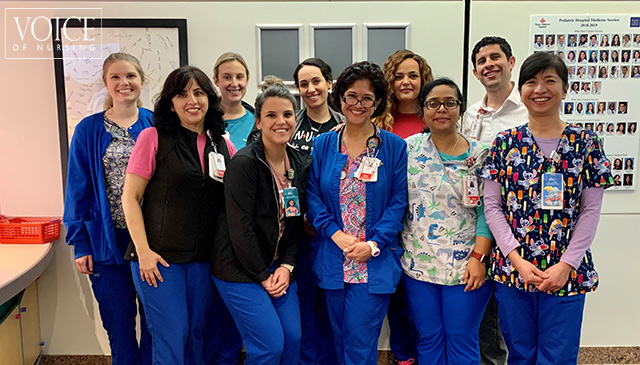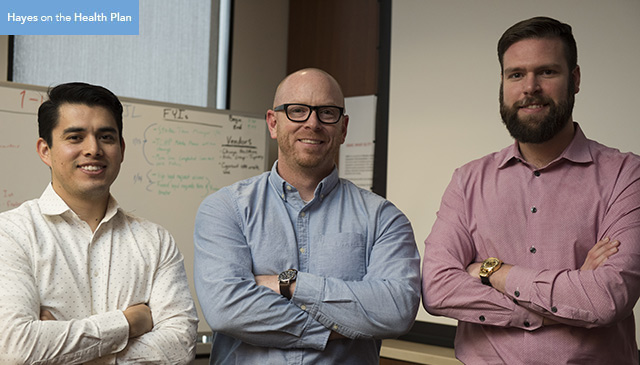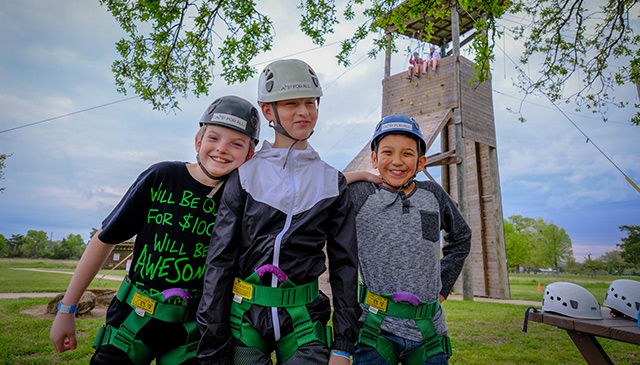
Norma Terrazas shares her experiences since the Abercrombie move to 15 West Tower three months ago, and has a special message for her colleagues in Abercrombie who will move to their new unit on 7 West Tower next month. Read more

Norma Terrazas shares her experiences since the Abercrombie move to 15 West Tower three months ago, and has a special message for her colleagues in Abercrombie who will move to their new unit on 7 West Tower next month. Read more
In celebration of Valentine’s Day, two employees share how their love story unfolded at Texas Children’s. If you have a love story to share, submit your video by midnight on February 14.
Texas Children’s and Baylor College of Medicine pediatric ophthalmologist Dr. Evelyn Paysse and Baylor College of Medicine refractive surgery specialist Dr. Mitchell Weikert have spent nearly two decades giving children with certain eye conditions hope of better vision.
The work they are doing focuses on children with amblyopia, a condition that if left untreated can lead to permanent vision loss.
“Amblyopia is a condition where the vision, in either one eye or both eyes, does not develop normally,” Weikert said. “If one eye has a lot more need for glasses, the brain may ignore that eye, and focus on the eye that’s creating a clearer image. If that happens, and it’s not discovered, or isn’t treated optimally, a child may never develop the vision they could have had in that eye and might end up with what we call a lazy eye, or amblyopia.”
The solution Paysse and Weikert are offering to patients who have not had success with traditional therapies such as wearing glasses or contacts, and patching the better-seeing eye, is a procedure called photorefractive keratectomy or PRK.
“Photo refractive keratectomy is a surface ablation of the cornea using an excimer laser,” Paysse said. “The laser shaves away, or somewhat sculpts, the cornea, taking away a certain amount of it to reduce the refractive error.”
The desired outcome of PRK is that the child’s refractive disorder will be improved or corrected and that their brain will then be able to better develop the vision in the weaker eye. Thus far, the majority of the more than 180 patients Paysse and Weikert have operated on have had excellent results.
“We find that the patients respond better if they are treated at a younger age,” Paysse said. “The reason is that amblyopia is a time-sensitive problem that you really must treat before the patient is visually mature in the brain.”
One patient who had success with PRK is 8-year-old Lila McLaughlin. Lila was born three months early with a myriad of vision problems that eventually led her and her mother, Laura, to Paysse, who performed PRK surgery on Lila just before her second birthday. The surgery, and a subsequent procedure, changed Lila’s life.
“She went into surgery and came back with what I say was a new set of eyes,” said Lila’s mother, Laura McLaughlin said.
Prior to PRK surgery, Lila’s vision was deteriorating quickly causing the toddler to become legally blind in one of her eyes. After undergoing PRK, Lila could see almost perfectly.
“This surgery has given her a healthy outcome,” Laura McLaughlin said. “Lila has blossomed into a phenomenal, fun-loving, feisty firecracker of a third grader.”
Lila herself is extremely thankful for the care she received from Paysse and others at Texas Children’s who have participated in her care.
“She’s a really great doctor,” Lila said. “She successfully helped me see way better than I used to.”
Currently, PRK surgery is not approved by the Federal Drug Administration in children. All the patients Paysse and Weikert have treated are part of a study led by the Institutional Review Board of Baylor College of Medicine, a consortium of committees that checks doctors’ protocols making sure they are designed safely.

As we approach Patient Experience Month 2020, the staff engagement committee has implemented a virtual film festival to excite and engage Texas Children’s employees.
Every hospital, clinic, team, unit, or department has ways that they demonstrate teamwork and care coordination each and every day. These exemplary methods are the reasons why we consistently stand out in pediatric health care, and we want you to share that with our ‘One Amazing Team.’
Whether it is a daily huddle/greeting, milestone celebrations, assisting the unit or project when it is short staffed, or ensuring care transitions are smooth and communication flows clearly, we want to know about it!
As a team effort, enter the Patient Experience Month 2020 Film Festival, and make a creative two minute video that demonstrates how our organization amplifies unity. The video should be fun, engaging, and overall reflects what it takes to be ‘One Amazing Team.’
Click here to view the film festival evaluation criteria. Prizes will be awarded in the categories of creativity, education, performance, and MORE!
The entry deadline is Monday, March 23. Click here to access the online submission form. For questions or concerns email patientexperience@texaschildrens.org.

The Houston Livestock Show and Rodeo takes over NRG Park from Tuesday, March 3 through Sunday, March 22. As we do every year, Texas Children’s will be giving employees an opportunity to conveniently purchase tickets for the different rodeo events, including those must-see musical performances.
Texas Children’s annual Rodeo Concert Ticket Drawing will take place from February 6 to February 13, during which employees will have the opportunity to purchase discounted tickets for this year’s most popular performances, including Dierks Bentley, Gwen Stefani, Willie Nelson, and more.
All tickets distributed through the Rodeo Concert Ticket Drawing are sold at a discounted rate. The cost is $30 for Sections 102, 120, 123, 130 and 140, and $35 for Section 325 (club seats). We are unable to accept requests for a specific concert ticket price – winners of the drawing will be awarded seat locations at random.
To participate in this year’s drawing, please follow these steps:
Step 1 – Before submitting your entry, make sure you:
Enroll in the Voluntary Purchase Program through MOLI. If you win the drawing, your tickets will immediately be purchased through payroll deduction. If you are not enrolled, please follow these instructions to sign up.
Create an account at Flash Seats to receive your concert tickets (should you win). For added convenience, all concert tickets will be issued electronically via Flash Seats. To register, visit flashseats.com.
Step 2 – Complete the online Rodeo Concert Ticket Drawing Request by Thursday, February 13.
Be sure to use the same email address associated with your Flash Seats account. This ensures proper electronic transfer of your concert tickets.
Select your preferred performer(s) and the number of tickets you agree to purchase if notified that you are a winner. Ticket maximum per employee is four (4). One drawing entry per employee.
Due to high volume, Human Resources is unable to confirm receipt of your drawing entry, accept changes or cancel your online form once received.
Human Resources will email the winners of the drawing by 3 p.m., Friday, February 21. If you are a winner, we will process the payroll deduction and transfer your tickets immediately.
It is important that you make sure you are enrolled in the Voluntary Purchase program AND use the same e-mail address as your Flash Seats account. Otherwise, your tickets will be forfeited to the next employee in line. No exceptions will be made. All concert ticket purchases are final.
TICKETS ON SALE NOW FOR RODEO FESTIVITIES
For added convenience, employees may also purchase tickets for several RODEOHOUSTON events, including NRG Park Admission, the World Championship Bar-B-Que Contest and Carnival Packs. Tickets are now available at multiple Texas Children’s campus locations until 4 p.m., Friday, February 28. For more information on pricing and sale locations, please click here.
QUESTIONS?
If at any time you have questions about The Houston Livestock Show and Rodeo, please contact our Benefits team at totalrewards@texaschildrens.org or call Total Rewards at 832-824-2421 (select option 1 and then press 2) from 8 a.m. to 5 p.m., Monday through Friday.
Let’s rodeo, Texas Children’s!

We all know it when we see it.
The people who excel at everything they do. The organizations that achieve all parts of their mission. The companies that deliver great service without fail. But do we understand what it takes?
I’ve been alive long enough to know that “high quality” doesn’t just happen. But I was reminded of this recently when I sat down to talk with three members of the Quality Team at Texas Children’s Health Plan.
After a conversation with quality improvement specialists Rosendo Cardoso Gonzalez, Jeremiah Judkins and Joshua Fernelius, it all came back to me. High quality requires the right people, planning, oversight and accountability. Becoming the best is never an accident.
For this reason, improving quality is – literally – a full-time job for this team.
We started our talk with acknowledging the health plan’s upcoming accreditation survey from the National Committee for Quality Assurance (NCQA). They explained to me that although our survey takes place in mid-April, the results are the sum of what we do every single day.
Here is a look inside our conversation:
How would you describe your roles at Texas Children’s Health Plan?
All: We are the team that serves as a resource to the entire health plan. We support leaders and front-line staff in a shared responsibility to achieve national HEDIS (Healthcare Effectiveness Data and Information Set) goals.
What is the most challenging part of the work that you do?
Rosendo – “Ro”: It’s a lot of work, but that’s why we are here. It’s also challenging because most issues are complex and don’t just involve one department. Making sure that multiple departments are on the same page can be difficult.
Jeremiah – “JJ”: Encouraging employees to use us a resource. Our job is to come in and rethink processes, systems and methods. Just because we’ve been doing something one way doesn’t mean we will keep doing it that way. But like Ro said, that’s why we are here – as a resource to help facilitate the changes.
Joshua – “Josh”: Fostering change in the organization. Lasting and sustainable change is never easy, however it’s important that we evolve for the sake of our members. They deserve for us to operate effectively at the highest level of care.
What is the most rewarding part of the work that you do?
Rosendo: It’s extremely rewarding when everyone comes together and focuses on reaching for the same goals. It’s also rewarding when we can maximize each other’s strengths to solve problems.
Jeremiah: I love Texas Children’s. I have a personal connection because my six-year-old daughter has had a health condition since she was in-utero. Texas Children’s helped save her life. I want to be part of ensuring that this organization is always operating at the highest level it possibly can.
Joshua: I have been invested in public health for many years. It truly is my passion. I enjoy the opportunity to positively impact the lives of more 400,000 health plan members each and every day. Your work seems to focus on the big picture, but what do you do on a daily basis to improve quality?
All: We run the daily operations briefing, which is the glue that holds The Health Plan together. The “DOB” offers a way to uncover organizational issues and bring barriers to the forefront. If we have more visibility into our challenges, we can solve them effectively.
***
Rosendo, Jeremiah and Joshua report to Yahaira Colorado, manager for Quality & Outcomes Management. Colorado’s team, together with Natasha Pierce – manager of Credentialing – and her team, are preparing The Health Plan to gain its NCQA accreditation this summer. For more information on NCQA, visit https://texaschildrensnews.org/strive-for-five-strive-for-five/
To learn more about “Hayes on The Health Plan” and to learn basic information about Texas Children’s Health Plan visit https://texaschildrensnews.org/hayes-on-the-health-plan/.

Know any cleft lip and palate patients who could benefit from meeting other people like themselves? If so, tell them about Camp Keep Smiling, a camp for Texas Children’s patients ages 10 to 16 years old with cleft lip and palate.
Hosted by the nonprofit Camp for All, the camp in Burton provides a safe, fun environment for patients between the ages of 10 and 16 to engage in meaningful social interaction and gain self-confidence. Participants can enjoy activities like canoeing, fishing, archery, ropes courses, basketball and arts and crafts.
Texas Children’s Pediatric plastic surgeon Dr. Laura Monson, who helped start the camp, leads the initiative with other team members from the plastic surgery division. Physicians, physician assistants, nurses, OR staff and child life specialists serve as counselors who notice tremendous strides in the campers towards the end of the session.
Admission is free of charge for patients as it is supported directly by donations and the help of generous volunteers.
This year’s camp is scheduled for Friday, March 6, to Sunday, March 8. Applications for patients to attend the camp are available online at this link and are due Friday, February 21. For questions, contact camp coordinator Michelle Roy at mgroy@texaschildrens.org or 832-822-3180.